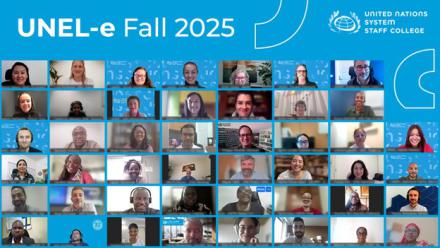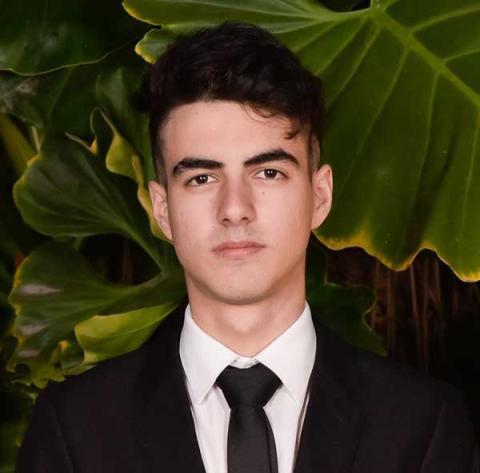
Leading through change: shaping the next generation of UN system leaders
Change has always been part of the United Nations’ story. Today, however, it is happening faster than ever. Across the world, communities are facing overlapping crises — from climate disruption and humanitarian emergencies to digital transformation, social inequality, and growing geopolitical divides.
In this complex landscape, UN personnel are expected not only to respond, but also to help others navigate uncertainty — even as they experience it themselves. Leadership in the UN is no longer defined by job titles or hierarchies; it is grounded in behaviour, shared values, and the ability to inspire and influence without formal authority. The move from top-down to more collaborative forms of leadership within the UN is well under way.
As the demands on the UN system increase, so does the need for leaders who can adapt, collaborate, and inspire. The question is no longer “Who leads?” but “How can each of us lead better?”
Leadership is reflected in how we handle disagreements among partners, how we listen to communities whose needs evolve faster than our plans, and how we respond under pressure when patience runs thin.
Mid-level staff often find themselves navigating the space between high expectations and uncertainty. They are tasked with turning broad mandates into real impact while balancing team wellbeing and the challenges of complex contexts. This kind of leadership requires emotional intelligence as much as technical skill.
In recent years, leadership development across the United Nations has moved beyond theory and strategy to focus on practical learning and the long-term application of leadership skills — not only in the workplace, but also in daily life. The UN Emerging Leaders e-Learning (UNEL-e) Programme is one example of how this shift is taking shape.
Over seven weeks, colleagues from peacekeeping missions, development programmes, and humanitarian operations come together not to learn in the cookie-cutter mold of what leadership is supposed to be but to explore what it truly feels like to lead in real life. The learning process combines learning sessions with experts and seasoned UN leaders, dialogue with peers across the UN system, coaching, and a 360-degree feedback assessment. It encourages participants to explore both their strengths and blind spots while empowering them to leverage these strengths and be mindful of identified growth opportunities.

The conversations that emerge in this programme truly reflect this new form of leadership in the United Nations. Participants speak about moments when stress changes their tone without them realizing it. They describe the challenge of leading teams dispersed across continents. They reflect on the difficulties of managing the uncertainty felt by teams when faced with constant changes in the system. Gradually, something important happens in these cohorts. The distance between screens disappears, and one thing becomes clear: none of us navigates these complexities alone. In a system as large and diverse as the UN, recognition can be transformative in of itself.
Participants often say that the most meaningful impact of UNEL-e is not a new tool or leadership model — valuable as those are — but the small changes they notice in their own behaviour. A pause before reacting. Choosing to ask one more thoughtful question instead of giving an answer. Realizing that influence grows as much through listening as through speaking. These shifts may seem small, yet they can transform the atmosphere of a team. They create room for perspectives that might otherwise go unheard, ease the tension that arises when pressure overshadows empathy, and turn individual tasks into shared goals.
The learning community that forms throughout the UNEL-e journey often becomes its own form of lasting impact. People who might never otherwise meet discover that they share similar questions, frustrations and hopes. Even after the programme ends, they usually remain as voices of support and insight for one another when new challenges emerge. These relationships may be quiet and unseen, but they strengthen the system from within.
In the end, leadership in today’s United Nations is not about having all the answers. It is about staying open when the answers aren’t yet clear. It is about holding space for dialogue even when urgency is pushing us toward quick conclusions. It is about continuing to learn while we lead, resisting the temptation to assume that experience alone will carry us forward.
Perhaps one of the most encouraging realizations from experiencing the UNEL-e programme is that none of us needs to wait for permission to lead. Growth can begin in the next conversation, the next decision, the next moment of uncertainty when we choose curiosity over assumption. The world will continue to change around us, and predicting the speed of these changes is likely futile, but we can shape how we respond to that change. We can choose to lead in ways that lift others, invite diverse voices, and build trust – piece by piece.
That is the kind of leadership the UN system needs. And it begins with each of us, exactly where we are.
For any inquiries on upcoming editions of the UNEL-e, and other customized programmes for emerging leaders, please email unele@unssc.org.
